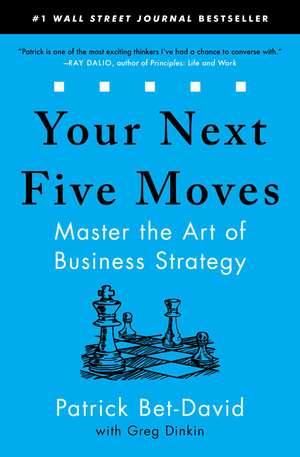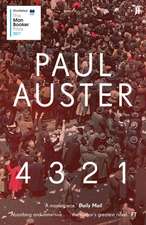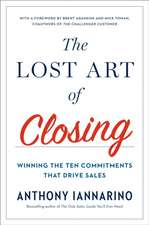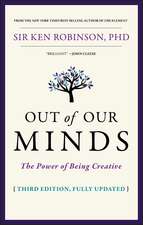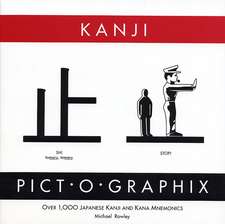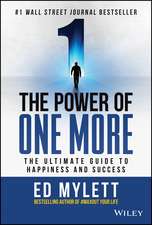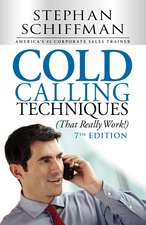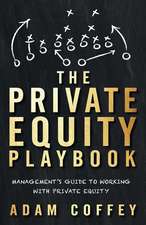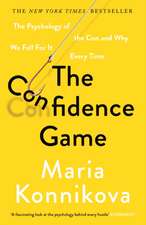Your Next Five Moves: Master the Art of Business Strategy
Autor Patrick Bet-David Cu Greg Dinkinen Limba Engleză Paperback – 22 iul 2021
From the creator of Valuetainment, the #1 YouTube channel for entrepreneurs, and "one of the most exciting thinkers" (Ray Dalio, author of Principles) in business today, comes a practical and effective guide for thinking more clearly and achieving your most audacious professional goals. Both successful entrepreneurs and chess grandmasters have the vision to look at the pieces in front of them and anticipate their next five moves. In this book, Patrick Bet-David "helps entrepreneurs understand exactly what they need to do next" (Brian Tracy, author of Eat That Frog!) by translating this skill into a valuable methodology. Whether you feel like you've hit a wall, lost your fire, or are looking for innovative strategies to take your business to the next level, Your Next Five Moves has the answers. You will gain:
CLARITY on what you want and who you want to be.
STRATEGY to help you reason in the war room and the board room.
GROWTH TACTICS for good times and bad.
SKILLS for building the right team based on strong values.
INSIGHT on power plays and the art of applying leverage. Combining these principles and revelations drawn from Patrick's own rise to successful CEO, Your Next Five Moves is a must-read for any serious executive, strategist, or entrepreneur.
| Toate formatele și edițiile | Preț | Express |
|---|---|---|
| Paperback (1) | 56.47 lei 25-37 zile | +24.44 lei 5-11 zile |
| Gallery Books – 22 iul 2021 | 56.47 lei 25-37 zile | +24.44 lei 5-11 zile |
| Hardback (1) | 102.71 lei 25-37 zile | +133.88 lei 5-11 zile |
| Gallery Books – 17 sep 2020 | 102.71 lei 25-37 zile | +133.88 lei 5-11 zile |
Preț: 56.47 lei
Preț vechi: 70.10 lei
-19% Nou
10.81€ • 11.74$ • 9.09£
Carte disponibilă
Livrare economică 04-16 aprilie
Livrare express 15-21 martie pentru 34.43 lei
Specificații
ISBN-10: 1982154810
Pagini: 320
Dimensiuni: 140 x 213 x 18 mm
Greutate: 0.26 kg
Editura: Gallery Books
Colecția Gallery Books
Notă biografică
Patrick Bet-David went from escaping war-torn Iran to founding his own financial services firm, raising tens of millions of dollars, and creating Valuetainment, the leading YouTube channel for entrepreneurs. His unorthodox approach to business as well as life has led to compelling interviews with Ray Dalio, Kevin Hart, the late Kobe Bryant, President George W. Bush, and a host of other luminaries. His content on social media has been viewed over a billion times. Patrick never obtained a college degree and went from the army to selling health club memberships before entering the field of financial services. At age thirty, he founded PHP, a financial services agency. He lives in Dallas with his wife and three children.
Extras
1 ![]() Who Do You Want to Be?
Who Do You Want to Be?
I believe that having questions is better than having answers because it leads to more learning. After all, isn’t the point of learning to help you get what you want? Don’t you have to start with what you want and figure out what you have to learn in order to get it?
—Ray Dalio, author of Principles: Life and Work and investor, on 2012 Time list of world’s 100 most influential people
Michael Douglas, playing Gordon Gekko in the 1987 film Wall Street, says to Bud Fox, played by Charlie Sheen, “And I’m not talking a $400,000-a-year working Wall Street stiff flying first class and being comfortable. I’m talking about liquid. Rich enough to have your own jet.”
Some people read that quote and say, “Making $400,000 a year and being comfortable sounds like a dream come true.” Some say nothing at all and claim they have no interest in material things. Others pound their chest and scream to the heavens that they’re going to have their own jet. What matters to me is what you think, since all your choices will be dictated by where you want to go.
Whether it’s a high school student asking for direction or a CEO running a $500 million company, when someone asks me a question, I respond by saying, “It all depends on how honestly you can answer this question: Who do you want to be?”
In this chapter, I’ll guide you to answer that question with clarity. I’ll also show you how to go back to the blackboard of your life and set a new vision for yourself that will fire you up and set you in motion. I’ll show you why making a plan and committing to it will unleash all the energy and discipline you’ll ever need.
Answer Questions to Reveal Your Deepest Desire
Nothing matters unless you understand what makes you tick and who you want to be. Far too often, consultants and influencers assume that everyone wants the same thing. When I’m speaking to a CEO or a founder, I start by asking questions. Before making any recommendations, I gather as much info as I can about who the person wants to be and what he or she wants out of life.
I understand that not everyone knows who he or she wants to be. It’s normal not to have all the answers immediately. Remember that this question—and every move in this book—is a process. All the examples I give and stories I tell exist for you. They’re meant to get you to reflect and better understand yourself. If you don’t have a clear answer at this point in time, you’re in the majority. All I ask is that you keep an open mind and keep reading with the goal, in due time, of answering this question.
The purpose of this Move is to identify what matters to you the most and help put a strategy together that fits your level of commitment and vision. I may influence you to question certain decisions or ways you’ll go about fulfilling your vision, but it’s up to you to decide to stretch yourself and think bigger.
Who do you want to be?
As you continue to ask yourself this question, your answer will determine your level of urgency. If you want to build a little mom-and-pop corner store, you don’t have to treat business like war and you can be laid back in your approach. If you’re looking to disrupt an industry, you’d better be armed with the right story, right team, right data, and right strategies. Really take the time to get clear about your story—exactly who you want to be—or you won’t be able to soldier on when things get tough. And in business, things always get tough.
Make Pain Your Fuel
I could sit here and tell you about the life that you may live one day. Talking about the cars, the jets, and the celebrities you meet all sounds wonderful, but first things first. You are going to have to endure more anguish than you can imagine to get there. Those who can tolerate pain the most—the ones with the most endurance—give themselves the highest chance of winning in business.
By the time we’ve been on our own for a few years, many of us have become cynical. It’s an ugly thing, but I’ve seen it happen too often. We all have big dreams growing up, and we make a lot of plans for ourselves. Then life gets in the way, the plans don’t happen the way we thought they would, and we lose faith in our ability to focus on who we want to be. You may not notice it, but it also hurts your ability to make your next moves.
We may even start to think, “Hey, what’s the point in saying I’m going to do something big if I’m not going to follow through? Better to just aim low and play it safe.”
The only thing separating us from greatness is a vision and a plan for achieving greatness. When you’re fighting for a cause, a dream, something greater than yourself, you will find the enthusiasm, passion, and joy that make life a great adventure. The key is identifying your cause and knowing who you want to be.
In the summer of 1999, I was twenty years old and had left the army. My plan: to become the Middle Eastern Arnold Schwarzenegger. That June, I felt certain I would become the next Mr. Olympia, marry a Kennedy, become an actor, and eventually govern the state of California.
As the first step in my plan, I got a job at a local gym, hoping to be noticed as soon as possible. At the time, the biggest fitness chain in the area was Bally Total Fitness. With the help of my sister, I got an offer from a Bally in Culver City. It had to have been the smallest and most antiquated Bally location in the state of California.
Despite the less-than-ideal circumstances, I was promoted and transferred to the largest Bally gym, which happened to be in Hollywood. My plan was working! Because I kept getting better at selling memberships, I was making $3,500 a month. Compared to what I had made in the army, it felt like millions.
One day, my supervisor, Robby, offered me an assistant manager position at the Bally in Chatsworth, thirty miles outside Hollywood. He wanted me to turn the club around; it had been hitting only 40 percent of its monthly goal.
I didn’t want to go to Chatsworth. I wanted to be a weekend manager in Hollywood, a position that paid $55,000 a year. Robby promised me that if I turned things around in Chatsworth, the job would be mine. The only other contender for it was a longtime employee named Edwin. As long as I outperformed him, I could bank on becoming the weekend manager in Hollywood.
Fast-forward ninety days. We were able to turn things around at the Chatsworth club, taking it from 40 percent of the monthly revenue goal to 115 percent. I was near the top of the leaderboard companywide, well ahead of Edwin. When I got a call from Robby to meet, I assumed that corporate must be pleased. My plans were coming together. I was going to meet the fitness legend Joe Weider, be spotted by a major Hollywood agent, get my acting career off the ground, and meet a Kennedy. I can vividly remember the anticipation I felt that afternoon before my meeting with Robby.
The moment I walked into Robby’s office, I knew something was off. This wasn’t the same guy who had promised me the position if I outperformed Edwin.
That’s just paranoia, I reassured myself. Give him the benefit of the doubt and hear what he has to say.
“Patrick, I’m so proud of the performance you and your team put up the last ninety days,” Robby said. “I want you to stay there for another six months and take the Chatsworth club to the next level.”
“What do you mean?” I asked. “I made it very clear that I wanted the weekend manager position in Hollywood.” That position, he said, had already been filled.
At that point, my blood was boiling. I couldn’t believe a grown man could look me in the eye after going back on his word. I had been so focused on beating the goal that I hadn’t put any thought into what I would do if it didn’t work out.
Who’d gotten the position? You guessed it: Edwin. Why? Edwin had been with Bally for six years; I’d been there for only nine months. Never mind my accomplishments, kicking Edwin’s tail on the national leaderboard. Never mind that, according to objective data, I had earned it.
In fairness to Robby, he wasn’t being unethical. Because he had to follow marching orders from corporate, he was being political. In many ways it was a blessing to learn at a young age that corporations have agendas and that advancement is rarely based on merit alone. Robby could tell I was furious, and he asked me to step outside to cool off. I walked to the parking lot and tried to think. I imagined how these events were going to dictate the rest of my life. I played the movie in my mind, and I just couldn’t accept how it would end if I accepted Robby’s decision. I didn’t realize it then, but I was already processing my next moves. The only challenge was that I was reacting to someone else’s move rather than executing my own. I walked back into his office and asked him if the decision was final. He said it was.
At that point, I looked him in the eye and told him I quit. Initially, he thought I was kidding, but I was confident about my decision. What’s the point of working somewhere that doesn’t give you a clear direction on what you need to do to advance in the company? Why put myself through the misery? It was at that moment I realized I could not live another day with my destiny in someone else’s control.
I wasn’t thinking like a winner at that point in my career. Given my inability to think more than one or two moves ahead, I was still an amateur. As a result, I was petrified. Driving home, I felt as though I’d made the worst decision of my life. My coworkers started calling me to ask what the hell I’d been thinking. My family couldn’t believe it, either.
By the time I got into bed that night, most of the emotion had worn off, and I was left wondering what I was going to do next. Later in my career, I learned how to process while in the heat of the moment. Thankfully, that night I was able to calm down just enough to think about my next moves. When I think back on it now, I realize that it was a defining moment in my life.
I had to look inward and get clear about who I wanted to be—and where I wanted to go. The list I made looked something like this:
- 1. I want to make the name Bet-David mean something, so much so that my parents will be proud of the decision they made to leave Iran.
- 2. I want to work with people who keep their commitments—especially leaders with whom I work and who impact my career path.
- 3. I want a clear formula for how to get to the top based purely on my results. I can’t stand surprises or the moving of goalposts.
- 4. I want to build a team that has bought into the same vision I have to see how far we can go collectively. This includes running mates whom I can trust 100 percent.
- 5. I want to make enough money that I’m no longer controlled by other people’s politics and agendas.
- 6. I want to get my hands on every single strategy book out there to see the game from a broader point of view so I can learn how to minimize corporate bullying.
Once I was clear about who I wanted to be, I could see my next moves. The first step was finding a sales job with merit-based pay and clear expectations. Twenty years later, I can tell you that clarity comes from making decisions that are aligned with your core beliefs and values.
Use Your Haters and Doubters to Drive You
I shared that story about being denied the promotion because I want you to tap into your own pain. It’s those moments of feeling powerless, angry, or sad that clue you in to your deepest drive. Don’t underestimate the power of shame to motivate you. When Elon Musk left South Africa for Canada at age seventeen, his father had nothing but disdain for his eldest son. In Neil Strauss’s November 2017 Rolling Stone profile, he quoted Musk’s description of his dad’s send-off: “He said rather contentiously that I’d be back in three months, that I’m never going to make it, that I’m never going to make anything of myself. He called me an idiot all the time. That’s the tip of the iceberg, by the way.”
Barbara Corcoran, the real estate mogul whom you may have seen on Shark Tank, was one of ten children growing up in a blue-collar New Jersey town. In 1973, she was twenty-three and working as a waitress in a diner. While there, she met a man who lent her a thousand dollars to start a real estate company. They fell in love and were set to live happily ever after. Had the script played out, my guess is that Corcoran would have built a decent real estate business. But in 1978, the man dumped her and married Corcoran’s assistant. To rub salt into the wound, he said to her, “You’ll never succeed without me.”
In a November 2016 interview with Inc. magazine, Corcoran said that she had turned fury into her best friend. “The minute a man talked down to me, I was my best self,” she said. “I was going to get from that person what I wanted, come hell or high water…. He was not going to dismiss me. I would not tolerate it. I would say quietly to myself, ‘F@#& you.’?”
That type of rejection, that type of shame, can be one hell of a motivator. I want you to think back to the teachers, coaches, bosses, parents, or relatives who have put you down over the years. This doesn’t mean you have to carry their negativity around with you. Instead, you can use it as rocket fuel. Corcoran channeled her rejection into resolve. As a result, she built the most successful residential real estate firm in New York and sold it for $66 million. Then she wrote a best-selling book and became a TV star on Shark Tank.
As an investor in entrepreneurs, Corcoran actually looks for people who are fueled by pain. She sees growing up poor as an asset. She said, “A bad childhood? Yes! I love it like an insurance policy. An abusive father? Fabulous! Never had a father? Better! My most successful entrepreneurs didn’t all have miserable childhoods, but somebody said they couldn’t, and they are still pissed.”
I’m not making light of your pain. Believe me, I experienced enough shame as a child to last a lifetime. It hurt then, and it still hurts now. Put-downs, insults, and abuse can be either your excuse or your fuel. And it’s damn powerful fuel.
Michal Jordan’s late father said, “If you want to get the best out of Michael Jordan, you tell him he can’t do something.” Five years after he retired from the NBA, when Jordan gave his Hall of Fame induction speech, guess what he talked about most? All of his haters and doubters. He still hadn’t gotten over those who had put him down. Leroy Smith Jr. was the guy who had taken his roster spot when Jordan had gotten cut from the high school team. To show you just how much Jordan used pain as fuel, he went so far as to invite Leroy to the ceremony. Jordan said, “When he made the team and I didn’t, I wanted to prove not just to Leroy Smith, not just to myself, but to the coach that picked Leroy over me, I wanted to make sure you understood: you made a mistake, dude.”
Musk, Corcoran, and Jordan all used pain as fuel. You can do the same. Think back to your toughest moments when you declared, “Never again!” Recalling those experiences will be your fuel.
I still feel as though I have enough haters in my life to fill Madison Square Garden. When I was twenty-six, I was invited to my alma mater, Glendale High School, to give a speech. I ran into a guidance counselor, Dotty, who asked, “Why are you here, Patrick? To see the motivational speaker?” She went on to tell me that she had always felt sorry for my parents. Here I was, twenty-six years old, being invited back to my high school to tell my success story, and Dotty was showering me with pity, reminding me that a decade earlier, she had felt sorry for my parents because I had been such a lost kid with no motivation or direction.
Dotty ended up escorting me to the auditorium, where six hundred students were waiting to hear from the motivational speaker, when suddenly the vice principal got up and started to introduce me as the speaker. The look on her face was priceless.
I didn’t say a word back to Dotty. Instead, I just filed her away as another hater who keeps popping up in my life. And those people keep driving me. As a matter of fact, I have a list of statements that people have made to me over the years. Most people read positive affirmations to produce confidence in themselves, but I have a completely different set of “affirmations” by people who doubted me or tried to put me down. Reading and rereading the list creates a level of fire inside me that all the money in the world can’t match.
Maybe the most important hater in my life was a stranger. When I was twenty-three, my dad had his thirteenth heart attack. I rushed to Los Angeles County Medical Center, a public hospital. The people there were treating him like dirt. I completely lost it—lashing out, throwing things. “You don’t mess with my dad! You crossed the line!” I was so out of control that security had to escort me out of the hospital. During my tantrum, a guy said to me, “Hey, listen. If you had money, you could get better insurance and get better doctors to take care of your dad. But you didn’t pay for this. Taxpayers are paying for this. This is called public health insurance.”
After they threw me out of the hospital, I sat in my Ford Focus, and the tears poured out of me. The anger was replaced by shame. The guy was right. My dad was getting lousy care because I didn’t have the money to provide him with better care. And I didn’t have the money because I spent more time in nightclubs than I did in front of customers. I was at a low point in my life. The woman whom I’d thought I was going to marry had just dumped me. I had $49,000 in credit card debt. For thirty minutes, I cried like a baby.
After all that crying, all the self-pity and shame, I finally got it. That night, the old Patrick died.
Everything about me changed. I used that pain to remember every slight I had heard in my life: “1.8 GPA. Loser. Hanging out with gangsters. Poor Patrick, he’s got no shot. Divorced parents. Mom’s on welfare. Had to join the army because he had no other choice. Never going to be anybody.”
I swore that my dad would never again work at the ninety-nine-cent store on the corner of Eucalyptus and Manchester in Inglewood, where he was regularly held up at gunpoint. He was never going to get lousy health care for the rest of his life. Neither he nor I was ever going to feel ashamed again.
I said to myself, “Bet-David. The world’s going to know this last name. I know the pain we went through. I know the challenges we went through as a family when we came to America from Iran. I remember how embarrassed Mom would get from speaking broken English. I remember the look on Dad’s face at family gatherings when he was looked down upon by people. Before long, you’re going to be so proud of your last name. You’re going to be so proud you came to America. You’re going to be so proud of the sacrifices you made.”
A funny thing happened the next day. No one recognized me. I got the best compliments of all time: “Pat, you’ve changed. We don’t even recognize you. We miss the old Pat. We want him back.” Back then, I was famous for going to all the nightclubs in LA from Thursday night to Sunday night. I used to go to Vegas twenty-six times a year. I told all my friends to stop inviting me. They didn’t listen. They figured it was only a matter of time before their old buddy was leading the charge to the clubs again.
Little did they know that they would never get back the old hard-partying, undisciplined Pat. I had shifted 180 degrees. It was game over. From that day forward, no one, including me, ever saw the old Pat again. I used all those haters as fuel, and it’s provided me with a steady flow of energy ever since, a reserve that I can call upon at any moment.
I want you to channel all your fury and pain into fuel. This is your show. If you change yourself and focus on who you want to be, nothing can stop you.
I’m getting worked up remembering these stories. They don’t hurt like they once did, but at the drop of a hat, I can go back to any of the scenes to produce the same fuel. Something tells me there will be many new ones to add to the list. And although the pain never vanishes, I now view all those haters and doubters as gift givers. Ultimately, they led me to a point of clarity about exactly who I want to be. They led me to say “never again” and to create a list of my nonnegotiables (things you are not willing to compromise no matter the circumstances). I encourage you to try to do the same.
In doing so, don’t compromise your quirks or other things that may seem weird to others—these idiosyncrasies are important because of what you have experienced and the way you are wired. You really need to get clear about what you can sacrifice and what you absolutely will not sacrifice. It will lead you to create your own list of nonnegotiables.
Discover What Role Suits You Best
All the discovery questions I’m asking are to lead you to find out which path suits you best. The key is to find the best position that highlights your talents. Founder? CEO? Chief strategy officer? Sales leader? Number two? Business developer? Intrapreneur? The list goes on. We’re living in an era in which entrepreneurs get the headlines, but that life may not be for you. That doesn’t mean there won’t be a place for you to build wealth and find fulfillment.
The only way to choose is by first understanding: Who do you want to be?
Being an entrepreneur is high risk and high return, both personally and financially. Most people only pay attention to the final product of a successful entrepreneur. People don’t see what he or she has overcome—all the struggles, the betrayals, the empty bank accounts. Being home at six o’clock to have dinner with your family is not always going to happen when you are an entrepreneur. Depending on the size of your vision, maybe you can pull it off most nights. But if you’re going to be a disruptor and build a multinational conglomerate, you’re going to have to make a lot of sacrifices. This is all a part of owning your next moves and having others, including your family, buy into them.
The busier you are, the more organized you’ll need to be. There’s this notion that you can’t win at the highest level and also have a great family life. It won’t be easy, but you can find a way to make it work if it matters to you. It’s a choice only you can make. For me, being an example to my kids of fighting to fulfill my vision is more important than being home for dinner every night. My family understands this because we’ve planned for it. Plus, having more money gives you more choices. You may have to work on holidays. Having resources provides you with the flexibility to take your family with you and turn a work trip into a family vacation. As with everything, there are risks and rewards, costs and payoffs. The route you choose will depend on your answer to the question: Who do you want to be?
Embody Who You Want to Be by Living Your Future Truth
How many times have you heard a person say, “When I make it, I’ll…” Or “Once I’m successful, I’ll…” You hear people say things such as “When I make my first million…” or “Once we move into our own building…”
I understand the chicken-and-egg conundrum. You can’t build a world-class headquarters or license the slickest software until you have cash flow. What you can do—regardless of your income—is position yourself in the best way possible by making the right moves.
A phrase I use all the time is future truth. It means to live in the present as if your future truth has already become a reality.
I’m inspired by this quote from IBM founder Thomas J. Watson:
IBM is what it is today for three special reasons. The first reason is that, at the very beginning, I had a very clear picture of what the company would look like when it was finally done. You might say I had a model in my mind of what it would look like when the dream—my vision—was in place.
The second reason was that once I had that picture, I then asked myself how a company that looked like that would have to act. I then created a picture of how IBM would act when it was finally done.
The third reason IBM has been so successful was that once I had a picture of how IBM would look when the dream was in place and how such a company would have to act, I then realized that, unless we began to act that way from the very beginning, we would never get there.
In other words, I realized that for IBM to become a great company it would have to act like a great company long before it ever became one.
Did you get that last sentence? You must act like a great company (or a great entrepreneur/intrapreneur) long before you ever become one. Are you following? Let me explain.
A visionary is somebody who is not living in the here and now. He or she has already seen at least five moves ahead and is living in that reality. Explaining your future truth to others, however, may come across as unrealistic, boastful, or even delusional. Not long after we started our company in 2009, I gave a speech at the JW Marriott in Palm Desert, California, to a group of four hundred people. I said, “One day, the best comedians, athletes, thinkers, and US presidents will attend and speak at our convention.” Nine years later, Kevin Hart performed at our annual convention. Before our agency turned ten, I interviewed former president George W. Bush and the late Kobe Bryant in front of our entire company.
People want to follow someone who is driven by his or her future truth. It’s the reason we’re enamored with visionaries. As long as the person speaking has 100 percent conviction, he or she will get others fired up.
The best leaders have the ability not only to believe in future truths but also to inspire others to believe and execute their vision. On May 25, 1961, President John F. Kennedy delivered a Special Message on Urgent National Needs to a joint session of Congress. JFK’s goal was clear: “before this decade is out… landing a man on the Moon and returning him safely to the Earth.” With five months to spare, that future truth became reality when, on July 20, 1969, Neil Armstrong became the first person to walk on the Moon.
Do you know who you want to be? Do you have a clear vision of what that looks like? At this very moment, is the way you are acting consistent with your future truth?
Use Your Heroes and Visuals to Remind Yourself Who You Want to Be
To take things to the next level and set the bar even higher, aspire to be heroic. Think about your heroes, and ask yourself how they would act in such situations. It’s no coincidence that there is an entire cottage industry of books asking “What would [name] do?”
You want to be wealthy? There’s a book titled What Would the Rockefellers Do? How the Wealthy Get and Stay That Way, and How You Can Too. Want to be more like the founders of America? Reference the book What Would the Founders Do? Our Questions, Their Answers.
Asking what someone else would do forces you to take a time-out and consider your next sequence of moves. The second thing it does is challenge you to embrace greatness. I believe so strongly in challenging myself to reach another level that I hired an artist to create a unique visual for my office.
It’s an unusual painting with an unusual name: Dead Mentors. It stops people in their tracks as soon as they see it. In the painting, I’m surrounded by a number of people who could never have been in the same room together.
Whenever I’m in my office, I turn to them constantly for counsel. They are people with whom I like to process issues on all levels: economics, competition, strategy, politics, and my personal life. Seeing these ten luminaries together is a constant reminder to me to embody ten heroic traits.
From left to right: Albert Einstein, John F. Kennedy, bust of Marcus Aurelius, Abraham Lincoln, Tupac Shakur, Patrick Bet-David (the student trying to soak up wisdom), Mohammad Reza Pahlavi, Ayrton Senna, Milton Friedman, Martin Luther King, Jr., bust of Aristotle.
I chose individuals who differed in their philosophies yet were in the same field.
John F. Kennedy and Abraham Lincoln. One was a Democrat, while the other was a Republican. Both were great presidents, yet each took a different approach to getting things done. Both were eventually assassinated, for different reasons (which I won’t go into now).
Albert Einstein and Milton Friedman both had a way of viewing the world through the eyes of a mathematician, but they disagreed on the economy and taxes.
Tupac Shakur and Dr. Martin Luther King, Jr., both wanted similar outcomes but took different approaches. They were also both killed for having strong views.
Mohammad Reza Pahlavi, the shah of Iran from 1941 to 1979, changed his country’s direction until his inability to handle too much power led to the fall of an empire. He’s a reminder to never get so confident as to underestimate an opponent such as Ayatollah Ruhollah Khomeini, who led the revolt that exiled him.
Ayrton Senna, the greatest Formula One driver in history, tested his limits to take his craft to the very edge of perfection. He reminds me to push boundaries and hone my power of concentration (I named my daughter Senna).
Marcus Aurelius was a leader who never put himself above the people. He didn’t let power get to his head. A practitioner of stoicism, he reminds me to stay both centered and humble.
Aristotle was the voice of reason in Alexander the Great’s ear when he was on his way to becoming king. The ability of the Greek philosopher to think and reason reminds me of the importance of slowing down and taking the time to process issues.
In the back, I am whispering something in Tupac’s ear while listening to the discussion being led by Abraham Lincoln.
On the far right, there’s an empty seat for someone, who one day may be revealed.
Together, the people in this painting have become a personal assembly of mentors whom I turn to daily. Who do you have in your mentoring vault, whether dead or alive, that offers perspective and counsel?
Creating a visual of your heroes will challenge you to live up to the ideals of those you seek to emulate.
Every time I walk into my office, this painting moves me. I’ve continued to up the ante. I also have a custom bookshelf that’s fifteen feet long and spells out READ. All the images in my office push me to think and make clearer decisions. I often plot my next five moves in this room because it’s filled with a spirit that makes me think big.
My office is bizarre, and it was expensive to create. The key is to start somewhere. I started off with pictures from magazines that I taped to my bathroom mirror and now have my entire office as a reminder of what inspires me. I challenge you to find a way to create a visual that reminds you to be heroic. Start with something small. You don’t need to hire an artist; Photoshop will do.
If you’re a visionary, blow up a picture of Walt Disney or Steve Jobs and put it in a prominent place. Have a little fun with it. If looking at Walt Disney doesn’t inspire you, keep a picture of Mickey Mouse or a stuffed Mickey in your office.
If you’re building an e-commerce company, ask, “What would Jeff Bezos do?”
If you’re running an investment firm, ask, “What would Warren Buffett do?”
If you’re running a media company, ask, “What would Oprah Winfrey do?”
Our heroes inspire us. That’s why it’s so powerful to surround yourself with them. The more we see them and the more we see them looking at us, the greater our chances of acting heroically.
Who do you want to be?
That’s the question we started with, and it’s the one we’ll end with. The only way to answer it is by becoming clear about the life you want to live. In doing so, you will immediately embody that person and act as if you are already there.
It’s a lifelong practice. I hope the tools in this chapter will lead to some breakthroughs and get you onto the path to knowing who you truly want to be.
Recenzii
“Patrick is one of the most exciting thinkers I’ve had a chance to converse with.”
—Ray Dalio, author of Principles: Life and Work
“Patrick is one of the most driven goal oriented individuals that I have ever met. What he has done has inspired so many including myself. I am not only a friend I am a fan.”
—Kevin Hart
“Patrick is unusual because he’s a highly successful business person but he’s [also] a thinker… Plato would’ve called him a philosopher-king.”
—Robert Greene, author of The 48 Laws of Power
“[I believe in and follow] Patrick Bet-David. He has the drive and the fire to make a difference.”
—Steve Wozniak, cofounder of Apple
“A former veteran himself, Patrick’s teaching style and story is now inspiring other veterans to become entrepreneurs.” —Robert Kiyosaki, author of Rich Dad Poor Dad
“Patrick helps entrepreneurs understand exactly what they need to do next.”
—Brian Tracy, author of Eat That Frog!
Descriere
From the creator of Valuetainment, the #1 YouTube channel for entrepreneurs, and "one of the most exciting thinkers" (Ray Dalio, author of Principles) in business today, comes a practical and effective guide for thinking more clearly and achieving your most audacious professional goals.
Both successful entrepreneurs and chess grandmasters have the vision to look at the pieces in front of them and anticipate their next five moves. In this book, Patrick Bet-David "helps entrepreneurs understand exactly what they need to do next" (Brian Tracy, author of Eat That Frog!) by translating this skill into a valuable methodology. Whether you feel like you've hit a wall, lost your fire, or are looking for innovative strategies to take your business to the next level, Your Next Five Moves has the answers.
You will gain:
CLARITY on what you want and who you want to be.
STRATEGY to help you reason in the war room and the board room.
GROWTH TACTICS for good times and bad.
SKILLS for building the right team based on strong values.
INSIGHT on power plays and the art of applying leverage.
Combining these principles and revelations drawn from Patrick's own rise to successful CEO, Your Next Five Moves is a must-read for any serious executive, strategist, or entrepreneur.
